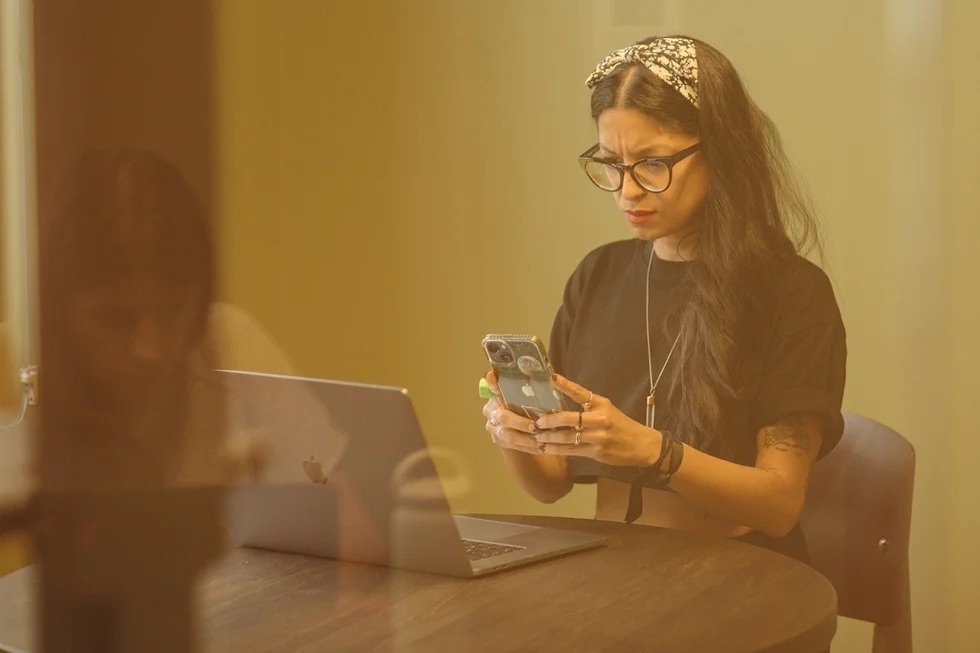WFH and AI: Feeling alone and disconnected from the team
Oct 11, 2023
5 mins

BA
Journaliste freelance
With the rise of working from home and artificial intelligence, the days of bonding with coworkers at the coffee machine are a distant memory for many of us. We’re more connected than ever, but at the same time, we’re growing apart, leaving many employees with a deep sense of loneliness. This loss of social connection is taking a toll on well-being, health, and productivity. “After a year of working remotely, I realized I had become more introverted,” says Montse, a 33-year-old global regulatory manager in the pharmaceutical industry who had been working alone in her apartment. “When life picked up again after lockdown and I started socializing with people, I noticed my communication style had changed. I was still listening and laughing, but I had become quieter.”
Working remotely, aka working in solitude
Like Montse, millions of people worldwide embraced working from home, whether by choice or out of necessity, during the pandemic. Today workplaces have shifted away from traditional offices and hiring is happening across miles, sometimes across continents. Yet, as work has become more flexible, it has also become more isolating. “I enjoy working remotely, but it’s also a challenge because I feel disconnected from the team,” Montse says.
Thanks to the flexibility, work-life balance, and time savings it offers, remote work has won over many employees and has become an aspect of employer branding. While workers aren’t ready to give up this privilege, according to a study conducted by Stanford University, it’s undeniable that many feel lonely and isolated. Jenifer, a 35-year-old business analyst in the tech industry, has been working remotely since her office closed permanently three years ago. To reconnect with fellow workers, she takes a different approach. “I head to a coworking space once a week. It does me good. We don’t chat much, but just watching others work motivates me,” she says.
Social connections at work are crucial
As we put more distance between ourselves, these new ways of working bring up the question of how important our social ties at work are to us. “You have to be wary of ‘false friends,’ ” says Johanna Rozenblum, a psychologist and author of Déconditionnez-vous! (Uncondition yourself!) The ‘false friends’ she is referring to are those that reinforce isolation, such as working from home, or phrases such as, “We trust you, you don’t have to discuss it with us.” That’s because working away by yourself all the time can lead to a loss of the social skills we developed in childhood including the ability to interact and communicate with others. In other words, “everything that allows us to be part of a group and live collectively,” she explains.
This phenomenon, reminiscent of Montse’s experience, is referred to as “cabin fever/syndrome.” It’s characterized by a lack of social interaction, a tendency toward withdrawal and isolation, feelings of sadness, loss of interest and motivation, and emotional fatigue. “I had nothing to say, nothing to contribute to the conversation,” recalls Montse. “I consulted a therapist because it seemed strange to me, and I felt sad. The therapist explained that it was normal after spending so much time alone and advised me to meet my friends with prepared conversation ideas related to current events or topics that interest me.”
Human beings are social animals who need to form connections. This is evident in an ongoing study conducted by four generations of researchers at Harvard University, investigating what makes us happy. Initially, in 1938, they hypothesized that happiness was tied to financial, material, and professional success. However, ultimately they discovered that the primary factor for happiness is the quality of our relationships with others.
These relationships encompass emotional closeness, trust, shared experiences, having fun and enjoying quality time together, feeling supported and secure, and being spurred on toward personal growth and development. “Meetings, empathy, and acts of affection are essential for maintaining a good emotional balance at work,” Rozenblum says. “Online connections can’t be compared to real-life connections.”
Artificial intelligence at the expense of social intelligence
Even though in-person connections are crucial, online connections seem to be strengthening with the growing use of artificial intelligence at work. “I’m increasingly using ChatGPT,” says Joslin, a 39-year-old project manager in communications. “It’s impressive how fast we can get information and how precise it is. I confess I’m starting to ask it more questions than I ask my team.”
According to Jo Ann Oravec, a professor at the College of Business and Economics at the University of Wisconsin, and author of the book Good Robot, Bad Robot: Dark and Creepy Sides of Robotics, Autonomous Vehicles, and AI, the decline in human-to-human relationships in favor of AI could lead to a decrease in social intelligence within organizations. She believes in the short term that companies may benefit from having employees specialized in AI, but these same employees might lack social intelligence, which could eventually cause problems when they need to communicate with others in emergency situations or make significant changes to the company.
Oravec’s ideas are supported by recent research in the Journal of Applied Psychology that shows an increase in alcohol consumption and loneliness, but a decrease in social connection at work among people who hold jobs in heavily automated and AI-populated environments.
Loneliness affects motivation and creativity
In the long run, disconnection from others, loneliness, and isolation at work can lead to “a loss of meaning, concentration, motivation, self-confidence, and enjoyment and can cause anxiety, melancholy, and mental and physical slowness,” says Rozenblum. Jenifer, who works 100% remotely, has found this to be true. “There’s a clear impact on my productivity, motivation, and efficiency,” she says. “I would accomplish much more in person.”
Montse also feels the effects of isolation. “My colleagues are together in the office in Ireland,” says Montse, “but I’m in Chicago, and I feel like an outsider. It’s challenging because I’m not building connections; it’s very impersonal and superficial. I share a moment with them in virtual meetings, but I miss out on the office atmosphere and inside jokes. It affects my motivation.”
In the United States, companies like Meta, Google, Starbucks, and Apple seem to have recognized the importance of social connections at work and their impact on productivity. These American giants are beginning to reverse their stance on fully remote work and are asking employees to return to the office. According to Mark Zuckerberg, “Engineers achieve better results when they work alongside their colleagues at least three days a week.” Mike Steinitz, director of Robert Half recruitment agency, says, “Innovation, creativity, and collaboration can suffer when teams are separated.”
Companies pay the price of employee isolation
Keeping employees physically apart from one another has an impact on productivity and, therefore, on the turnover of companies. According to Constance Hadley, a psychologist at the Questrom School of Business at Boston University, “Loneliness is a significant issue in organizations and costs billions of dollars in lost productivity, turnover, and health costs.” A study by Cigna Healthcare reported that loneliness could cost the American economy more than $406 billion a year. The study also found that workers suffering from loneliness were twice as likely to miss a day of work than their peers.
In addition to its role in promoting happiness, team cohesion enhances a company’s performance. “This is why it’s crucial that loneliness isn’t seen as an individual’s problem – it’s the organization’s problem,” Hadley says. Strong and positive relationships at work can bring financial and social benefits to everyone.
What can be done to reduce loneliness?
To counter the effects of isolation without removing a benefit for employees, many experts advocate using a hybrid model. This means a few days of WFH and a few days in the office alongside coworkers. Nicholas Bloom, a professor at Stanford University and an expert on remote work, believes in this approach. “Hybrid working balances the advantages of being in the office with the benefits of working from home,” he says.
Oravec warns against being too reliant on AI. “Every employee or client who uses AI systems should be made aware of its potential biases and shortcomings from the beginning” even if it dampens their enthusiasm, says Oravec. This could mitigate any adverse effects, she says, adding that companies should give employees “the option move away from working with AI-based systems and work in environments with a strong social infrastructure” centered around people.
Translation by: Lorraine Posthuma
Photo: Welcome to the Jungle
Follow Welcome to the Jungle on Facebook, LinkedIn, and Instagram to get our latest articles every day, and don’t forget to subscribe to our newsletter!

More inspiration: Remote work

Office FOMO? New employees may be missing out on career growth opportunities
Young employees working remotely may be missing out on key career growth opportunities—are the trade-offs worth it?
Oct 31, 2024

The do's and don'ts of working remotely on vacation
Can you truly combine work and vacation? With remote working becoming more popular, many are exploring their options.
Jul 18, 2024

Can remote work and parenting coexist?
Remote work is a godsend for many parents, but that doesn't mean it's easy. How can you make working from home work for you?
May 15, 2024

Where do freelancers fit into the new fractional world of work?
The shifting tech job market is fueling the rise of fractional work and transforming traditional employment …
Jan 29, 2024

Why I chose to go back to the office
Although remote work provides flexibility and autonomy, some employees are choosing to go back to the office. To find out why...
Jan 03, 2024
The newsletter that does the job
Want to keep up with the latest articles? Twice a week you can receive stories, jobs, and tips in your inbox.

Looking for your next job?
Over 200,000 people have found a job with Welcome to the Jungle.
Explore jobs